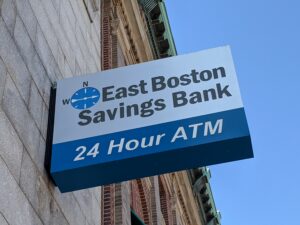With stock markets declining and businesses closing, banks and credit unions last week began announcing programs to help customers with financial difficulties resulting from the coronavirus outbreak.
Unlike during the Great Recession, when financial institutions were at the center of the crisis, banks are now in a position to support their customers with loan modifications or other moves to help them along.
“This was not a situation created by a financial event,” Richard Gavegnano, president and CEO of East Boston Savings Bank, told Banker & Tradesman. “This is a question of defeating a virus, getting people’s confidence back and getting people back to the workforce.”
Banks can help consumers in part because of Dodd-Frank Act mandates implemented over the past decade. Thomas Curry, former comptroller of the currency and now a partner at Nutter, said in a webinar last week that Dodd-Frank’s requirements helped banks build up sizable capital and liquidity reserves and helped improve the quality of their regulatory capital.
“We’re fortunate that U.S. banking organizations have built up substantial levels of capital and liquidity, well in excess of regulatory minimums and buffers,” Curry said.
Curry added that the last financial crisis gave the banking industry the opportunity to clean up their balance sheets. It also put a spotlight on operational risks within banks, especially related to mortgage servicing and foreclosures, giving organizations and regulators opportunities to address these issues.
“I think at the end of the day we’re very fortunate that we’ve had 10 years to build up the financial sector so that it can be better prepared to deal with the coronavirus pandemic that we’re experiencing today,” Curry said.
Opportunity to Regain Trust
David Cotney, former Massachusetts commissioner of banks and now senior advisor at FS Vector, said in the same webinar that the last financial crisis was a scar on the banking industry’s reputation, even though most community banks were not responsible for the practices that led to the crisis.
“There’s an opportunity here today for banks and particularly big banks, given their strong capital and balance sheets, to really reclaim the mantle of trust they once had with the public at large by working with consumers and especially small business that we all hope will recover once the worse of this pandemic has passed,” Cotney said.
Federal and state regulators have released multiple statements encouraging financial institutions to support customers. The Federal Reserve has taken steps to provide liquidity so banks will continue lending activities.
Gavegnano said he had never seen federal agencies react so quickly to a crisis, adding that a full commitment from the government helps financial institutions operate.
Some steps taken by East Boston Savings to support customers include increasing debit card spending limits upon request, raising remote deposit limits for individuals, waiving penalties for early CD withdrawals and placing a 90-day foreclosure moratorium on residential loans.
The bank is also reaching out to borrowers and reviewing lending relationships to see what would help take pressures off small businesses and other customers, Gavegnano said, such as interest-only payments and extending maturity dates.
He added that the bank will continue to use sound, prudent judgement in its banking and lending decisions, pointing out that East Boston Savings Bank has long histories with many small businesses and understands their operations and needs.
Once the virus is contained, Gavegnano said East Boston Savings Bank would continue to help customers recover.
“We want to see people get back to where they were before this happened, and we’re committed to work with them to accomplish that,” Gavegnano said.




 |
| 




